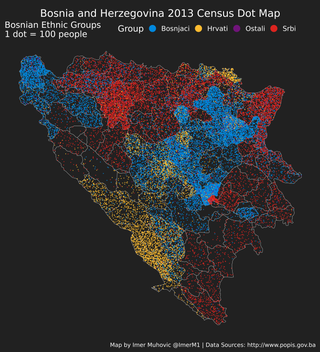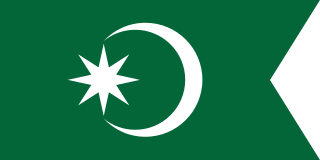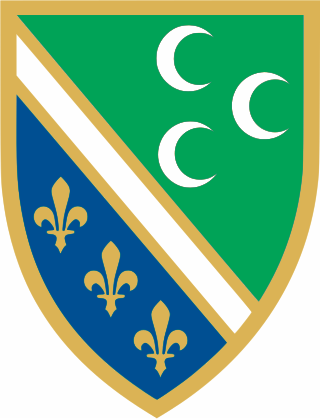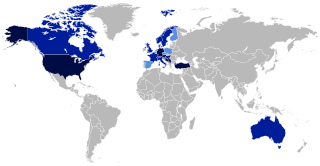In terms of religion, Muslims in Bosnia and Herzegovina are all adherents of Islam in Bosnia and Herzegovina.
Muslims in Bosnia and Herzegovina can also refer to:

More than 96% of population of Bosnia and Herzegovina belongs to one of its three autochthonous constituent peoples : Bosniaks, Serbs and Croats. The term constituent refers to the fact that these three ethnic groups are explicitly mentioned in the constitution, and that none of them can be considered a minority or immigrant. The most easily recognisable feature that distinguishes the three ethnic groups is their religion, with Bosniaks predominantly Muslim, Serbs predominantly Eastern Orthodox, and Croats Catholic.
"Muslims" is a designation for the ethnoreligious group of Serbo-Croatian-speaking Muslims and people of Muslim heritage, inhabiting mostly the territory of the former Socialist Federal Republic of Yugoslavia. The term, adopted in the 1971 Constitution of Yugoslavia, groups together a number of distinct South Slavic communities of Islamic ethnocultural tradition. Prior to 1993, a vast majority of present-day Bosniaks self-identified as ethnic Muslims, along with some smaller groups of different ethnicity, such as Gorani and Torbeši. This designation did not include Yugoslav non-Slavic Muslims, such as Turks, some Romani people and majority of Albanians.

Islam is the most widespread religion in Bosnia and Herzegovina. It was introduced to the local population in the 15th and 16th centuries as a result of the Ottoman conquest of Bosnia and Herzegovina.

This article is about the Demographic history of Bosnia and Herzegovina, and deals with the country's documented demographics over time. For an overview of the various ethnic groups and their historical development, see Ethnic groups in Bosnia and Herzegovina.

The Ottoman Empire era of rule in Bosnia and Herzegovina lasted from 1463/1482 to 1878 de facto, and until 1908 de jure.

Islam in Montenegro refers to adherents, communities and religious institutions of Islam in Montenegro. It is the second largest religion in the country, after Christianity. According to the 2011 census, Montenegro's 118,477 Muslims make up 20% of the total population. Montenegro's Muslims belong mostly to the Sunni branch. According to the estimate by the Pew Research Center, Muslims have a population of 130,000 (20.3%) as of 2020.
Bosniaks are a mainly-muslim South Slavic ethnic group, native to the region of Bosnia and the region of Sandžak. The term Bosniaks was re-instated in 1993 after decades of suppression in the Socialist Federal Republic of Yugoslavia. The Bosniak Assembly adopted the ethnonym to replace "Bosnian Muslims." Scholars believe that the move was partly motivated by a desire to distinguish the Bosniaks from the fabricated and imposed term Muslim to describe their nationality in the former Yugoslavia. These scholars contend that the Bosniaks are distinguishable from comparable groups due to a collective identity based on a shared environment, cultural practices and experiences.
Religion in Montenegro refers to adherents, communities, institutions and organizations of various religions in Montenegro. While Eastern Orthodox Christianity is the dominant religious denomination in Montenegro, there are also sizable numbers of adherents of both Catholic Christianity and Islam.
Bosnians, citizens of Bosnia and Herzegovina or people who identify as Bosnians on an interethnic basis.

The Muslims in Slovenia are ethnically mostly Bosniaks and ethnic Muslims. In 2014, there were 48,266 Muslims in Slovenia, making up about 2.4 percent of the total population. The Muslim community of Slovenia is headed by Nedžad Grabus. There are also a few Muslim migrant workers from Central Asia; however, they are not counted in the census, because they are not citizens of Slovenia.

Serbia is a Christian majority country, with Islam being a minority faith representing around 3% of the total population. Islam spread to Serbia during the three centuries of Ottoman rule. The Muslims in Serbia are mostly ethnic Bosniaks, Albanians and significant part of Muslim Roma as well as members of the smaller groups, like ethnic Muslims, Gorani and Serbs (Čitaci).

Bosniaks are the third largest ethnic group in Serbia after Serbs and Hungarians numbering 153,801 or 2.31% of the population according to the 2022 census. They are concentrated in south-western Serbia, and their cultural centre is Novi Pazar.
The Islamic Declaration is an essay written by Alija Izetbegović (1925–2003), republished in 1990 in Sarajevo, SR Bosnia and Herzegovina, SFR Yugoslavia. It presents his views on Islam and modernization. The treatise attempts to reconcile Western-style progress with Islamic tradition and issues a call for "Islamic renewal". The work was later used against Izetbegović and other pan-Islamists in a 1983 trial in Sarajevo, which resulted in him being sentenced to 14 years' imprisonment. He was released after two years.

The most widely professed religion in Bosnia and Herzegovina is Islam and the second biggest religion is Christianity. Nearly all the Muslims of Bosnia are followers of the Sunni denomination of Islam; the majority of Sunnis follow the Hanafi legal school of thought (fiqh) and Maturidi theological school of thought (kalām). Bosniaks are generally associated with Islam, Bosnian Croats with the Roman Catholic Church, and Bosnian Serbs with the Serbian Orthodox Church. The State Constitution of Bosnia and Herzegovina (BiH) and the entity Constitutions of the Federation of Bosnia and Herzegovina and the Republika Srpska provide for freedom of religion, and the Government generally respects this right in ethnically integrated areas or in areas where government officials are of the majority religion; the state-level Law on Religious Freedom also provides comprehensive rights to religious communities. However, local authorities sometimes restricted the right to worship of adherents of religious groups in areas where such persons are in the minority.

Bosniak nationalism or Bosniakdom is the nationalism that asserts the nationality of Bosniaks and promotes the cultural unity of the Bosniaks. It should not be confused with Bosnian nationalism, often referred to as Bosniandom, as Bosniaks are treated as a constituent people by the preamble of Constitution of Bosnia and Herzegovina, whereas people who identify as Bosnians for nationality are not. Bosniaks were formerly called Muslims in census data but this model was last used in the 1991 census.
The Bosniaks are a South Slavic ethnic group native to the Southeast European historical region of Bosnia, which is today part of Bosnia and Herzegovina, who share a common Bosnian ancestry, culture, history and language. They primarily live in Bosnia, Serbia, Montenegro, Croatia, Kosovo as well as in Austria, Germany, Turkey and Sweden. They also constitute a significant diaspora with several communities across Europe, the Americas and Oceania.

Bosnians are people native to the country of Bosnia and Herzegovina, especially the historical region of Bosnia. As a common demonym, the term Bosnians refers to all inhabitants/citizens of the country, regardless of any ethnic, cultural or religious affiliation. It can also be used as a designation for anyone who is descended from the region of Bosnia. Also, a Bosnian can be anyone who holds citizenship of the state of Bosnia and Herzegovina and thus is largely synonymous with the all-encompassing national demonym Bosnians and Herzegovinians.

Bosniaks are a Slavic Muslim ethnic group living in Kosovo, numbering 27,553 according to the 2011 census. The vast majority of Bosniaks are adherents of Sunni Islam.

Serb Muslims or Serb Mohammedans, also referred to as Čitaci, are ethnic Serbs who are Muslims by their religious affiliation.
Bosnian Muslims can refer to: